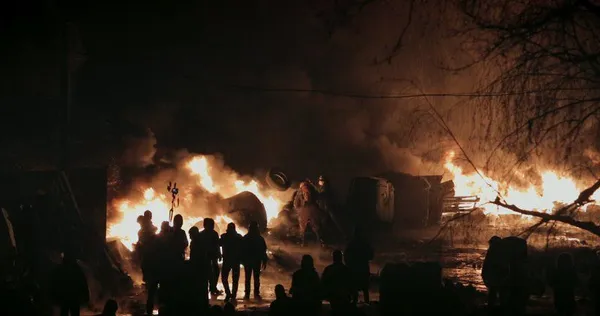Eye For Film >> Movies >> Maidan (2014) Film Review
Maidan
Reviewed by: Jennie Kermode

In November 2013, Ukrainian President Viktor Yanukovych declined to sign a trade agreement that would have brought his country closer to the political institutions of Europe, instead leaving it dependent on agreements with Russia and acting as a buffer state between east and West. Public demonstrations began at once, but initially, though they made a few international headlines, they didn't seem like a big deal. The government looked the other way. It would weather them. Things would go back to normal. Ultimately, as the Jam put it, the public wants what the public gets.
There was just one problem. The demonstrations didn't go away.
Instead, they intensified. More and more people spilled out onto the streets - all sorts of people from very different backgrounds, united by a feeling that, after years of corruption, they hd had enough. By February of the following year, permanent encampments had been established in the heart of the capital and religious leaders had joined those making rousing speeches to the crowd. The security police were beginning to get restless. One way or another, something had to give.
Assembled entirely from footage recorded at the time, Maidan is almost entirely dialogue free, with only snatches of those speeches and the occasional mutterings of passers-by to provide us with clues as to what was being fought for. In the style of immersive masterpieces like Leviathan, it simply plunges us into the action. In the streets, on rooftops, inside public buildings requisitioned by emergent committees, we watch people go about the business of registering their dissent. Though initially difficult to get into, this soon becomes gripping. Anyone who has been on a demonstration will connect with that is going on, with the spirit of the thing, even if they now nothing of the politics. It feels instantly familiar, intimate and absorbing. So when, in the middle of this, a man says out of the blue that the people have had enough of lies, enough of corruption, enough of people being tied to radiators and dropped in the river, it's a brutal reminder of just how much more dangerous this situation is than anything most of us have known.
Inevitably, thing begin to go wrong. More and more riot police can be glimpsed on the borders of the crowd. Organisers start seeking out people with medical skills. A child looks for his missing brother. Small squabbles break out between demonstrators and policemen; then one night, all hell breaks lose.
We stay with it. For days. What was a familiar demonstration becomes shocking, becomes civil war. The unseen camera operator takes refuge where possible; views become obscured, but we still see quite enough of what's going on, and we hear it. Shouts more than screams. This isn't Hollywood. Gunfire, though, a much more disturbing sound than usual in this situation. And voices, words unclear, expressing confusion. More than anything, there is a sense of deep confusion that people would turn on each other, that people who did nothing but stand in the street and shout should suddenly start dying.
Purely observational though it is, this is a film that becomes devastating in its intensity. It shows us the human story behind all those news reports, and it may leave us wondering why, in the aftermath, the news told us so little. Up close, these events seem overwhelming. Yet were they not facing another brutal conflict, who now would remember the Ukrainians?
Reviewed on: 14 Feb 2015
















